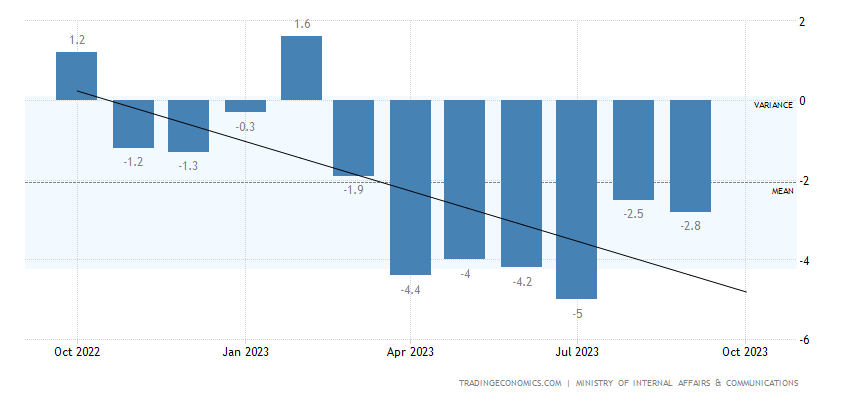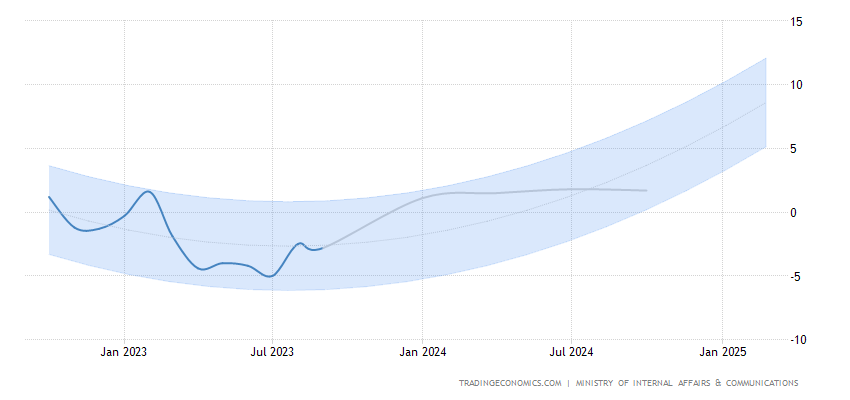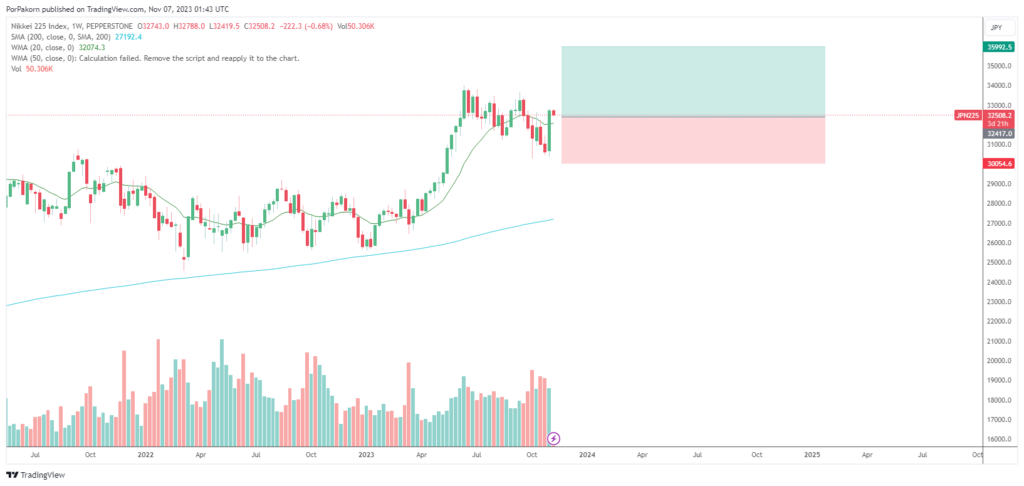Introduction
The Japan economy continues to face challenges in September 2023 as household spending declines by 2.8% year-on-year, deviating from market expectations. This marks the eighth consecutive monthly decline, raising concerns about the nation’s economic stability. In this in-depth analysis, we explore the factors contributing to this decline, shedding light on the complex web of influences that affect household expenditures in Japan. Additionally, we offer expert insights and advice on navigating these turbulent economic waters.
Factors Impacting Household Spending:
Household spending in Japan has been on a downward trajectory, with September 2023 witnessing a 2.8% year-on-year decline. This decline can be attributed to various factors that impact different sectors of the economy.
Food Expenditure: One of the primary contributors to the decline in household spending is the decreasing expenditure on food, which experienced a significant drop of 3.7% in September. The increased cost of living and declining income levels are pushing families to cut back on their food budgets, impacting overall consumption.
Housing Expenses: The housing sector, which is usually considered a stable expense, has witnessed a surprising 11.2% decline. The sharp increase in housing costs, combined with the economic uncertainties, has led many households to reconsider their housing options and reduce expenditures in this category.
Furniture & Household Utensils: Furniture and household utensils saw a substantial 14.7% decrease in spending, reflecting the cautious approach of households towards non-essential items. This reduction is indicative of the prevailing uncertainty in the Japan economy.
Clothing & Footwear: The clothing and footwear sector is grappling with a severe 18.3% decline, largely due to the financial strains on households. High inflation rates and stagnant income levels are forcing consumers to cut back on discretionary spending.
Medical Care and Education: Household spending on medical care declined by 1.5%, while education expenses decreased by 9.7%. These sectors, though relatively stable, are feeling the effects of a prolonged economic slump, prompting families to reevaluate their spending in these areas.

Culture & Recreation:
The culture and recreation sector saw a decline of 1.6% in spending, further emphasizing the cautious sentiment among households. The uncertainty surrounding the Japan economy is leading to reduced investments in leisure activities.
Positive Developments:
Despite the overall gloomy picture, there are a few areas that show resilience within the Japanese economy.
Fuel, Light & Water Charges: While many sectors are experiencing declines, spending on fuel, light, and water charges increased by 0.5%. Households seem to prioritize these essential utilities, reflecting the necessity of these services even in challenging economic times.
Transport & Communication: Transport and communication expenditures picked up strongly with a 12.4% increase, defying the overall trend. This may be a sign of adaptation to remote working and the need for better connectivity in a changing work environment.

Expert Advice on Navigating the Japan Economy:
To navigate the complex economic landscape of Japan in the face of declining household spending, it’s essential to consider a few key strategies.
Budgeting and Financial Planning: Households must adopt prudent budgeting and financial planning strategies to mitigate the impact of rising costs. Reducing discretionary spending and allocating resources wisely can help families weather the economic storm.
Investment Diversification: Investors should diversify their portfolios and consider alternative investments to protect their wealth in times of economic uncertainty. Real assets and international investments can provide stability in a volatile market.
Government Support Programs: Families should stay informed about government support programs and subsidies that may provide relief in difficult times. These programs can help bridge financial gaps during economic downturns.
Education and Upskilling: Investing in education and upskilling can enhance job security and income potential. Individuals should consider courses and training that align with emerging job market trends.

In summary, the dip in household spending in Japan offers a reflection of the intricate obstacles the nation’s economy grappled with in September 2023. Although the horizon may seem shrouded in uncertainty, it also presents an arena for resilience and ingenuity, both for households and investors, as they navigate these turbulent waters. Through the adoption of sound financial strategies and vigilance regarding available government assistance, individuals and families can reinforce their economic foundations and assume a pivotal role in breathing new life into Japan’s economy. It’s a litmus test for adaptability, and armed with the right approaches, we can transform adversity into opportunity, illuminating the path toward a more promising economic future for Japan.






One thought on “Japan Economy: An In-Depth Look at Sector-Specific Trends”